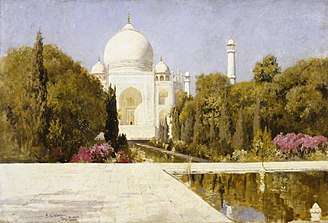Ustad Isa
Ustad Isa Shirazi (Persian: استاد عيسى شیرازی translation Master Isa) was a Persian architect, often described as the assistant architect of the Taj Mahal in Agra, India.

The lack of complete and reliable information as to whom the credit for the design belongs, led to innumerable speculations. Scholars suggest the story of Ustad Isa was born of the eagerness of the British in the 19th century to believe that such a beautiful building should be credited to a European architect. Local informants were reported to have started British curiosity regarding the origins of the Taj by also supplying them with fictitious lists of workmen and materials from all over Asia. Typically, he is described as a Persian architect.
Recent research suggests the Persian architect, Ustad Ahmad Lahauri was the most likely candidate as the chief architect of the Taj Mahal, an assertion based on a claim made in writings by Lahauri's son Lutfullah Muhandis.[1][2][3][4]
See also
- Taj Mahal- Built (1632-1653)
- Mughal architecture
- Shah Jahan (1628-1707)
Ustad Isa Shirazi was the assistant of Ustad Ahmad Lahori.
Footnotes
- UNESCO advisory body evaluation, Retrieved 30 Nov 2016
- Asher, p.212
- Begley and Desai, p.65
- http://www.columbia.edu/itc/mealac/pritchett/00islamlinks/ikram/part2_14.html, Retrieved 30 Nov 2016
References
- A; Desai, Z.A. (1989). Taj Mahal - The Illumined Tomb. University of Washington Press. p. 392. ISBN 978-0-295-96944-2.
- Koch, Ebba (Aug 2006). The Complete Taj Mahal: And the Riverfront Gardens of Agra (First ed.). Thames & Hudson Ltd. ISBN 0-500-34209-1.